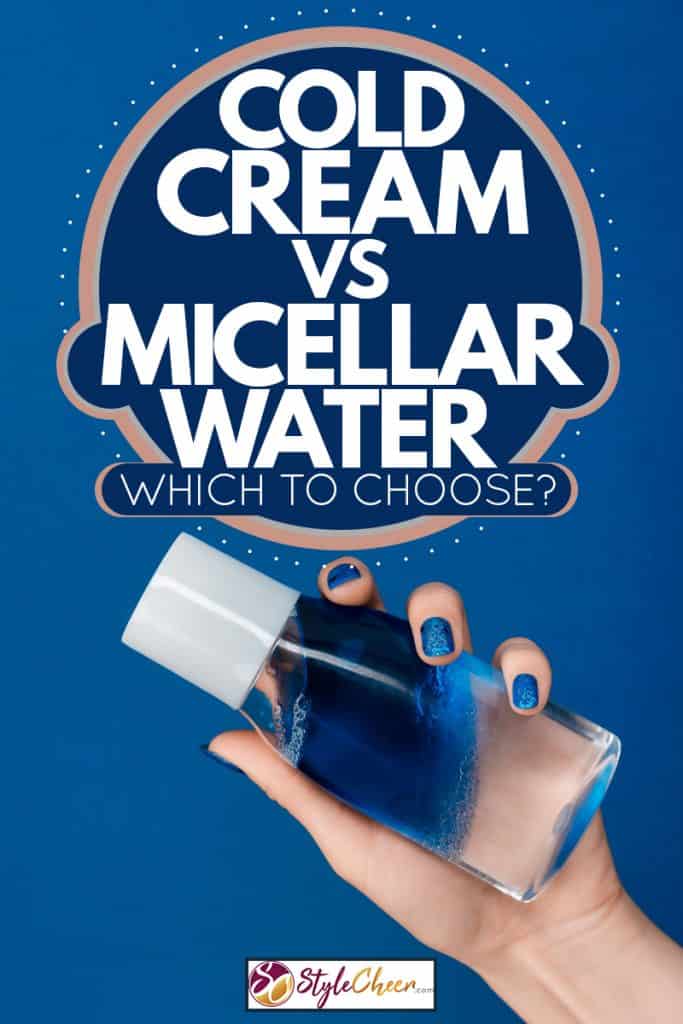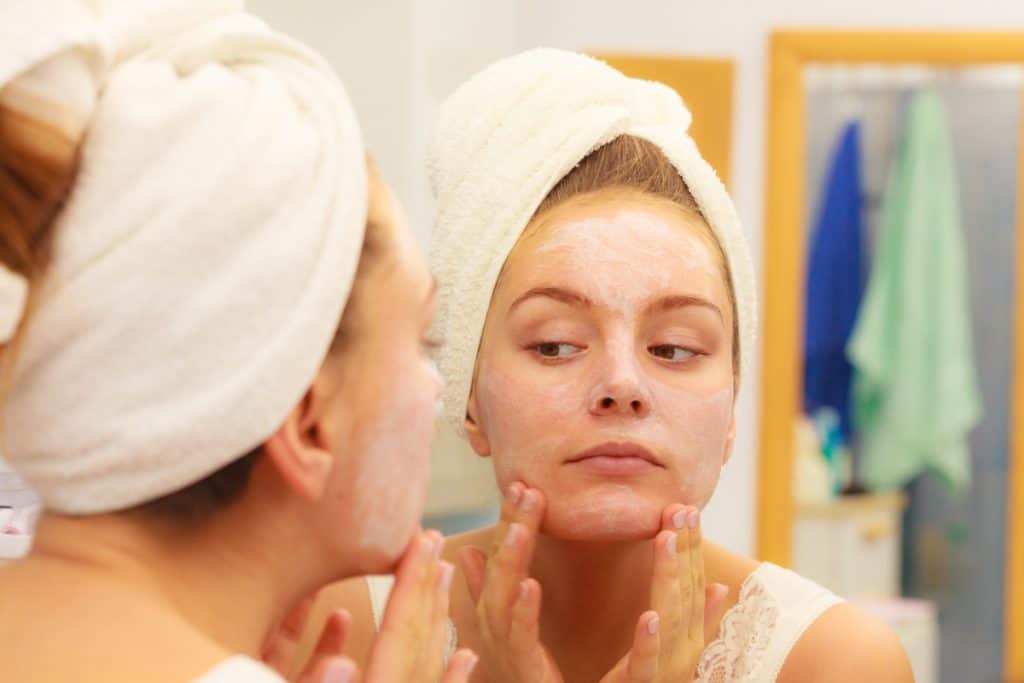In the world of beauty, there are thousands of skincare products that make all sorts of promises. We know it can be overwhelming, trying to understand what your skincare routine requires. Cold cream and micellar water are two types of skincare products that have been around a long time and probably sound familiar. But do you know what they are and what they do? Are they right for your skin type? We've researched the uses of cream versus micellar water to explain the differences and similarities of these products, so you'll know which to choose for your skin.
Cold cream and micellar water are similar skincare products; both are applied to your skin and wiped away. As cleansing agents, both products remove dirt, makeup, and excess oil. Cold cream and micellar water have hydrating properties that won't strip moisture from your skin while cleansing. Even though these products act similarly, they have different properties and ingredients. The primary consideration to focus on when deciding which product is best for you is your skin type.
Keep reading as we dig deeper into the differences between cold cream and micellar water. We'll guide you through the pros and cons, helping you decide which product is suited for your skin type, whether you have normal, dry, sensitive, or oily skin.

This article may include affiliate links and elements that were carefully created by our team using advanced ai to help you envision the best style advice.
Cold Cream Vs. Micellar Water
Cold cream and micellar water are both used for cleansing and moisturizing, but the formulations of these products can vary. Usually sold in a jar, cold cream has a thick consistency designed for your hands to slather it on to your face. Micellar water looks like water and kind of feels like it too, but it's more viscous. The application of micellar water is best using a cotton ball or soft cloth.
Micellar water is ideal for most skin types. It's lighter and gentler than the cold cream. Cold cream isn't harsh but tends to feel oiler because its texture is heavier. It's not ideal for skin that is acne-prone or oily. If you wear a lot of makeup, cold cream is a better option for thoroughly cleansing your skin than micellar water.
What are the Ingredients in Cold Cream?
Two essential ingredients go into making a cold cream: oil and water in equal amounts. To create texture and structure, a cold cream, emulsifiers, and thickening agents are added. The oil in cold cream can vary but most often will contain beeswax, jojoba, mineral, or olive oils.
If your skin is dry or sensitive or you have rosacea, you might see some relief with cold cream. Skin that suffers from acne should not use this type of product as it might be too oily and aggravate your condition. It's best to check the label of cold creams and make sure it doesn't contain ingredients that might irritate your skin condition.
What is Micellar Water?
Micellar water is a mixture of water and a humectant like glycerin. It might also contain a surfactant to act as the emulsifier. Little balls of oil or micelles are created and float in the water. These micelles are in charge of cleansing by drawing out dirt from your skin. Your skin won't dry out since micellar water also contains hydrating ingredients; it acts as a moisturizer.
Most skin types can apply micellar water without worry. It's soothing and non-irritating for even sensitive skin. But if your skin is prone to breakouts, this might not be smart to add to your routine. Micellar water might clog pores on congested skin if makeup remains on your skin.
If you have concerns about moisturizers clogging your skin, read our post Can Moisturizer Clog Pores or Cause Pimples?

Do You Need to Moisturize After Micellar Water?
Determining whether you need to moisturize after using micellar water to cleanse your skin will depend on your skin type. For the best results, we recommend using micellar water as a light-duty face cleanser. Then, follow up with moisturizer in your morning and evening routines. Micellar water is a convenient, on-the-go product for a quick cleanse to take to the gym or while traveling. As a hydrating beauty product, it will work for some skin types, but some folks will need to add another moisturizer to their regime.
You can learn more about moisturizers in our post Can You Use Day Moisturizer Overnight?
Which Micellar Water is the Best?
There certainly isn't a shortage of micellar water products to choose from in the marketplace. Here is a list of some top products to consider on Amazon broken out according to skin type:
Sensitive Skin
Soothe your sensitive skin with Bioderma Sensibio H2O Micellar Water, Cleansing and Makeup Removing formula. Click here to see on Amazon.
Normal Skin
Your skin will feel refreshed with Garnier SkinActive Micellar Cleansing Water, featuring rose water and glycerin. Click here to see on Amazon.
Dry Skin
Hydrate and cleanse your dry skin with CeraVe Micellar Water. Click here to see on Amazon.
Oily Skin
La Roche-Posay Effaclar Micellar Cleansing Water and Makeup Remover is oil-free and won't clog your pores. Click here to see on Amazon.
Can You Leave Cold Cream on Overnight?
Cold creams have hydrating ingredients and can be left on your skin overnight. Your skin type and skincare goals determine whether to leave cold cream on overnight.
Cold creams are more like a moisturizing cleanser. Use these creams to wipe off dirt or makeup without stripping moisture from your skin. For some people, this might be enough of a moisturizer. But, if you have dry skin, you'll want to add another product to your regime. And, if you are looking for products to fight anti-aging, you'll wish to seek out skincare products that contain specific ingredients to target your goals.

Which Cold Cream is the Best?
Cold creams have been a beauty secret passed on from generation to generation. And these days, there are many to choose from in the market. We've featured some of the best cold creams by skin type.
Sensitive Skin
Soothe your sensitive skin with the hypoallergenic Eau Thermale Avene Hypersensitive Skin. Click here to see on Amazon.
Normal Skin
The longtime favorite of cold creams, Pond's Nourishing Moisturizing Cream, gets the job done and is loved by all. Click here to see on Amazon.
Dry Skin
The classic cold cream from Nivea Crème in the blue tin offers hydration for dry skin. Click here to see on Amazon.
Oily Skin
Queen Helene Professional Cleansing Cream is suitable for oily skin. Just remember to wipe off with a soft and damp towel or cloth. Click here to see on Amazon.
Let Your Skin Type Decide
While cold creams and micellar water are similar, they also have many differences. To decide which one to use, you need to determine your skin type. You should also take into consideration the makeup you use and how much you apply.
Choose a product based on your skin type. Most of us fall into a category like normal or dry skin. But many folks have skin conditions like acne or rosacea that require products that won't aggravate their conditions.
Whether you choose to add a cold cream or micellar water to your beauty routine, there will be no shortage of products out there to suit your needs. We hope you have found the information in this post helpful. Now it's time to cleanse and hydrate your skin.









![Scientist holding Cyanoacrylate glue, Is There An Eyelash Glue Without Cyanoacrylate? [A Guide to Finding Safe Alternatives] - 1600x900](https://stylecheer.com/wp-content/uploads/2023/09/shutterstock_2238414685-300x169.jpg)
![Applying lash glue onto fake eyelashes, Why Is My Lash Glue Not Sticking? [Common Reasons and Solutions] - 1600x900](https://stylecheer.com/wp-content/uploads/2023/09/shutterstock_1059533828-300x169.jpg)
![Pouring black lash glue onto a small mat, What Glue Do Lash Techs Use? [A Guide to Lash Extension Adhesives] - 1600x900](https://stylecheer.com/wp-content/uploads/2023/09/shutterstock_1541038103-300x169.jpg)